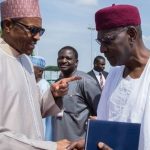Twenty-five years have passed since the demise of General Sani Abacha, Nigeria’s enigmatic and controversial military ruler. Serving as the nation’s head of state from 1993 until his sudden death in 1998, Abacha left an indelible mark on Nigeria’s history. As time distances us from his era, it becomes essential to reflect on his life and times, reevaluating his impact on the nation, his leadership style, and the enduring legacies he left behind.
TVC News Senior Executive, Digital and Social Media, Wasiu Salami writes on the life and times of Nigeria’s former Head of State, Sani Abacha 25 Years after His Death
Early Life and Military Career:
Born on September 20, 1943, in Kano State, Nigeria, Sani Abacha hailed from a modest family background. After completing his early education, Abacha joined the Nigerian Army in 1963, launching a military career that would shape the nation’s future. Known for his discipline and strategic acumen, Abacha steadily climbed the ranks, participating in various peacekeeping missions and demonstrating his leadership abilities.
Ascension to Power:
Abacha’s defining moment came in 1993 when he played a significant role in the annulment of Nigeria’s freest and fairest election, which was widely seen as won by Chief Moshood Abiola. Following a series of political turmoil, Abacha seized power on November 17, 1993, declaring himself Nigeria’s military head of state.
Rule and Controversies:
Abacha’s time in power was characterized by an iron-fisted approach. He cracked down on political opponents, suppressed dissent, and tightened his grip on power. Human rights abuses, including widespread reports of torture, extrajudicial killings, and censorship of the media, stained his administration. Furthermore, allegations of massive corruption against Abacha and his family continue to surface, suggesting the misappropriation of billions of dollars from Nigeria’s treasury.
Despite these controversies, Abacha’s regime also implemented policies that garnered support from certain quarters. He implemented economic reforms, including the establishment of the Nigerian Stock Exchange and the privatization of state-owned enterprises. Abacha also pursued infrastructure development projects, such as the construction of roads and bridges, which aimed to improve the nation’s transportation network.
International Standing:
On the international stage, Abacha faced significant criticism for his human rights abuses and alleged involvement in drug trafficking. Nigeria became diplomatically isolated during his rule, with several countries, including the United States and the European Union, imposing sanctions and freezing his assets abroad. The strained relationship with the international community further contributed to his controversial legacy.
A Polarizing Figure:
Sani Abacha’s tenure was marked by a complex mix of achievements and allegations. While his supporters lauded his firm approach to governance and his commitment to tackling corruption, critics vehemently condemned his autocratic rule, widespread human rights abuses, and the stifling of democratic institutions. Understanding Abacha’s legacy necessitates an objective examination of both the positive and negative aspects of his rule.
Consolidating Power and Controversial Governance:
Assuming power after the annulment of the June 12, 1993, presidential election, Abacha’s regime was characterized by political repression and the curtailment of civil liberties. He dissolved democratic institutions, disbanded political parties, and established a Provisional Ruling Council, granting himself unchecked power. Critics argue that this centralized authority perpetuated corruption and suppressed dissent.
Economic Stabilization and Infrastructural Development:
During Abacha’s tenure, Nigeria experienced relative economic stability due to prudent fiscal policies and the rise in oil prices. Significant infrastructure projects were initiated, including road construction, power generation, and telecommunications development. While these efforts brought some progress, questions remain regarding the equitable distribution of resources and the sustainability of these projects beyond Abacha’s reign.
Human Rights Concerns:
The Abacha era witnessed a severe crackdown on opposition figures, journalists, and activists. Reports of torture, arbitrary arrests, and extrajudicial killings stained his regime’s record. The hanging of activist Ken Saro-Wiwa and the stifling of free speech through oppressive media laws remain prominent symbols of the era’s repression. Critics argue that these human rights violations overshadow any positive contributions made by the Abacha administration.
Posthumous Impact:
Since Abacha’s death, Nigeria has gradually transitioned to democracy, fostering a more open political environment. Institutions like the Economic and Financial Crimes Commission (EFCC) have emerged to continue the fight against corruption. However, some argue that remnants of the autocratic era persist, challenging the full realization of a transparent and accountable governance system.
Conclusion:
As Nigeria marks the 25th anniversary of Sani Abacha’s death, it is crucial to engage in a nuanced evaluation of his life and times. Acknowledging the positive aspects of his rule, such as his anti-corruption efforts and infrastructural development, is necessary.
Simultaneously, we must confront the significant human rights abuses and democratic setbacks that occurred under his leadership.
Reflecting on Abacha’s legacy should inspire a commitment to the ideals of democracy, good governance, and the protection of human rights, ensuring a brighter future for Nigeria and its people.














